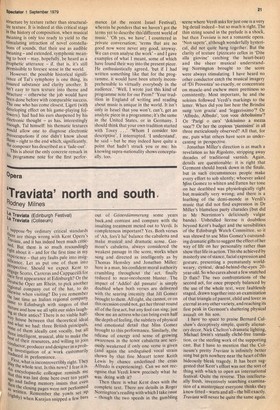Opera
Traviata' north and south.
Rodney Milnes a Travlata (Edinburgh Festival) Travlata (Coliseum) 1 suPpose /by ordinary critical standards !)..lere are things wrong with Kent Opera's ,,rtn'iate, and it has indeed been much critic;7(1. But there is so much resoundingly 'Ight about it — and for the first time in my experience — that any faults pale into insignificance. Let us put one of them into Perspective. Should we expect Kent to eihng.age Scotto, Carreras and Cappuccilli for 6"eir first appearance at Edinburgh? Or the r eutsche Oper am Rhein, to pick another iietginnal company out of the hat, to do 1.',4evvise when visiting? Do you remember :e last time an Italian regional company ,.11.1e to Edinburgh with singers of that islature and how we all split our sides laugh„rig at their antics? There is no viable half house between that theoretical ideal nhcl what we had: three British principals, three11°Ile of them ideally cast vocally, but all b intelligent, musical, able to make the est of their resources, and willing to join cinnne,uctor, producer and designer in a probtrg_. Investigation of a work customarily arta-iced in performance. pi, lilt, what is incontrovertibly right. They i "Y the whole text. Is this news? I fear t Is. An e th ncyclopaedic colleague reminds Me a at this was last done here over ten years tir and fading memory insists that even 4sen the closing pages were not performed 'written. \rightly) Remember the yowls set up When Karajan snipped a few bars out of Gotteratiimmerung some years back,ancl contrast and compare with the insulting treatment meted out to Verdi. Is completeness important? Yes. Both verses of `Ah, fors'e lui' balance the cabaletta and make musical and dramatic sense. Germont's cabaletta, always considered the weakest passage in the score, works when sung and directed as intelligently as by Thomas Hemsley and Jonathan Miller: here is a man, his confident moral authority crumbling throughout the act, finally reduced to near-incoherent bluster. The impact of 'Addio! del passato' is simply doubled when both verses are delivered with the searing intensity that Jill Gomez brought to them. All right, she cannot, or on this occasion could not, get her throat round all of the first act, but any fool can sing; just show me an actress who can bring even half the depth of feeling, the subtlety of physical and emotional detail that Miss Gomez brought to this performance. Similarly, the release of energy and sense of growing awareness in the tenor cabaletta are seriously weakened if only one verse is given (and again the undisguised vocal strain shown by that fine Mozart tenor Keith Lewis by chance underlined the crisis Alfredo is experiencing). Can we not recognise that Verdi knew precisely what he was doing with it? Then there is what Kent does with the complete text. There are details in Roger Norrington's reading with which I take issue — though the two speeds in the gambling scene where Verdi asks for just one is a very big detail indeed— but so much is right. The thin string sound in the prelude is a shock, but then Traviata is not a romantic opera. 'Non sapete', although wonderfully hysterical, did not quite hang together. But the clarity of texture (pizzicato cellos in Dite alla giovine' catching the heart-beat) and the sheer musical understanding Norrington brought to the score were always stimulating. I have heard no other conductor catch the musical imagery of 'Di Provenza' so exactly, or concentrate on muscle and eschew mere prettiness so consistently. Most important, he and the soloists followed Verdi's markings to the letter. When did you last hear the Brindisi sung 'con grazia' and `leggerissimo'? Or 'Alfredo, Alfredo', 'con vow debolissima'? Or Parigi o cara"dolcissimo a mezza voce'? Or her the copious 'pianissimi' in all three meticulously observed? All that, for me, puts what others have seen as undercasting in perspective.
Jonathan Miller's direction is as much a revelation as his Rigoletto, stripping away decades of traditional varnish. Again, details are questionable: it is right that Germont should break down in the finale, but in such circumstances people make every effort to sob silently; whoever asked Ivliss Gomez to whiten and flatten her tone on her deathbed was physiologically right but musically very wrong; and there is a loathing of the demi-monde in Verdi's music that did not find expression in Dr Miller's blameless party charades (but did in Mr Norrinton's deliciously vulgar banda). Unbridled license is doubtless beyond Kent's budget and the sensibilities of the Edinburgh Watch Committee, so it was shrewd to use Miss Gomez's outstanding dramatic gifts to suggest the effect of her way of life on her personality rather than show that life in action. This she achieved by masterly use of stance, facial expression and gesture, presenting a prematurely worldweary, cynical, dead-behind-the-eyes 20year-old. So who cares about a few snatched D flats? The two confrontations of the second act, for once properly balanced by the use of the whole text, were faultlessly staged, drawn together into an examination of that triangle of parent, child and lover as eternal as any other variety, and reaching its first peak in Germont's shattering physical assault on his son.
have no space to praise Bernard Cutshaw's deceptively simple, quietly alienatory decor, Nick Chelton's dramatic lighting, Michael Irwin's virtually cliche-free translation, or the sterling work of the supporting cast. But I have to mention that the Coliseum's pretty Traviata is infinitely better sung but gets nowhere near the heart of this hideously bleak tragedy. It has been suggested that Kent's effort was not the sort of thing with which to open an international festival. Quite the reverse. This intellectually fresh, inventively searching examination of a masterpiece everyone thinks they know fitted — warts and all — the bill exactly. Traviata will never be quite the same again.






























 Previous page
Previous page